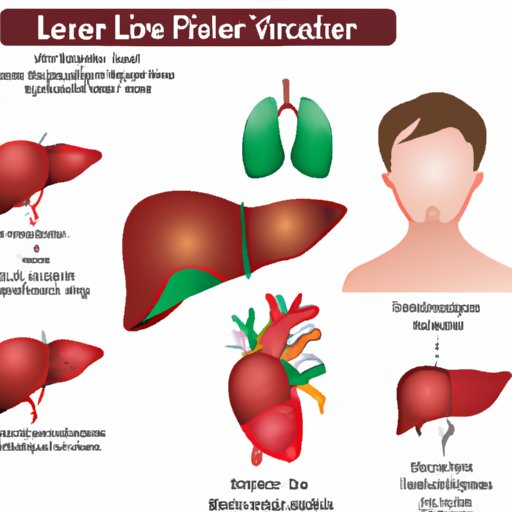
I. Introduction
Liver disease is a condition that affects the liver’s ability to function correctly. The liver is an essential organ responsible for processing nutrients and removing toxins from the body. Therefore, having a healthy liver is crucial for overall wellbeing. In this article, we’ll explore liver disease, its various types, symptoms, causes, and treatments to help you better understand the condition.
II. Understanding Liver Disease: Symptoms, Causes, and Treatments
Liver disease can be caused by various factors, such as viral infections, excess alcohol consumption, obesity, and autoimmune disorders. The symptoms of liver disease may vary depending on the type of liver condition, but some typical signs may include:
- Abdominal pain or swelling
- Yellowing of the skin and eyes
- Fever or fatigue
- Dark urine or pale stool
- Nausea or vomiting
- Loss of appetite
If you experience any of these symptoms, it’s essential to seek medical attention immediately. Your doctor may perform blood tests, imaging tests, or a liver biopsy to diagnose the condition.
The treatments for liver disease depend on the underlying cause. For instance, if the disease is caused by alcohol consumption, the treatment plan may involve quitting alcohol and adopting a healthy lifestyle. For viral infections such as hepatitis, antiviral medications may be prescribed, and liver transplant may be the last resort if other therapies fail.
III. What You Need to Know about Liver Disease: A Comprehensive Guide
There are various types of liver disease, and each presents unique symptoms and risk factors. Some of the common types of liver diseases include:
- Hepatitis A, B, and C
- Cirrhosis
- Nonalcoholic fatty liver disease (NAFLD)
- Autoimmune hepatitis
Some typical risk factors for liver disease include excessive alcohol consumption, obesity, high blood pressure, hepatitis infection, and long-term use of certain medications such as acetaminophen. If you have any of these risk factors, it’s essential to prioritize liver health by engaging in healthy habits, eating a balanced diet, exercising regularly, and avoiding risky behaviors such as illicit drug use, which may damage the liver.
In severe cases, liver disease can lead to life-threatening complications such as liver failure, liver cancer, and internal bleeding. Therefore, it’s important to seek medical help if you experience any of the symptoms mentioned earlier.
IV. Liver Disease 101: A Beginner’s Guide to Understanding the Condition
The liver is a vital organ responsible for processing nutrients and removing toxins from the body. It produces bile, which breaks down fats, and stores glucose for energy. When liver damage occurs due to various factors such as viruses, alcohol, or fatty tissue buildup, the organ cannot function adequately. This damage can occur in several stages, and it’s crucial to understand the progression to seek timely intervention.
There are three stages of liver disease:
- Stage 1: Inflammation
- Stage 2: Fibrosis
- Stage 3: Cirrhosis
During the inflammation stage, there is swelling in the liver, and liver enzymes are higher than normal. In the fibrosis stage, scar tissue forms, and the liver becomes stiff. Cirrhosis is the final stage whereby the liver’s structure changes, and the organ becomes irreversibly damaged.
V. The Impact of Liver Disease: How It Affects Your Body and Health
Liver disease can affect different systems within the body and cause long-term damage. For instance, the liver produces blood clotting factors, and if it’s damaged, it may cause uncontrolled bleeding. Additionally, the liver is responsible for metabolizing drugs, and if it’s not functioning correctly, it can lead to toxicity or overdose. The condition can also impair cell regeneration and cause liver cancer.
VI. A Deep Dive into Liver Disease: A Medical Professional’s Perspective
According to medical experts, liver disease is a complex condition that requires multidisciplinary care. Treatment plans may involve specialists such as gastroenterologists, hepatologists, oncologists, and nutritionists. Recent advancements in medical research have led to promising therapies, such as stem cell therapy and liver organoids, which have shown potential in repairing liver damage and reversing the effects of the disease.
VII. Fighting Back Against Liver Disease: Prevention and Treatment Options
Liver disease is preventable, and making healthy lifestyle choices can reduce the risk of developing the condition. Some of the lifestyle habits that can promote liver health include:
- Avoiding excessive alcohol consumption
- Eating a balanced diet rich in vegetables and fruits
- Exercising regularly
- Avoiding sharing needles or engaging in risky behaviors that may cause hepatitis infections
If diagnosed with liver disease, the treatment plan will depend on several factors such as the type and stage of the condition. Some of the common treatment options include medications, liver transplant, and lifestyle adjustments such as quitting alcohol or losing weight.
VIII. Breaking down Liver Disease: Types, Causes, and Diagnosis Methods
There are different types of liver disease, and diagnosis involves assessing the symptoms and risk factors of the patient. Some of the common diagnosis methods include:
- Blood tests: used to measure liver enzymes and evaluate liver function
- Imaging tests: such as an ultrasound or MRI
- Liver biopsy: involves collecting tissue samples from the liver to assess the extent of damage
Some of the common types of liver disease include hepatitis A, B, C, alcoholic liver disease, NAFLD, and cirrhosis. Understanding the type of liver disease you have can help in developing an effective treatment plan and prevent further complications.
IX. Conclusion
Liver disease is a severe condition that affects the liver’s ability to function correctly. Understanding the causes, symptoms, and treatment options can help in early detection and intervention, promoting better outcomes. It’s crucial to prioritize liver health by engaging in healthy habits, avoiding risky behaviors, and seeking medical help if you notice any symptoms of the condition. Remember, prevention is always better than cure.
Call-to-action: If you or a loved one suspects having liver disease, seek medical help immediately for early diagnosis and treatment.





